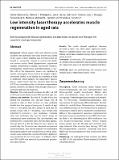Low intensity laser therapy accelerates muscle regeneration in aged rats
Author(s)
Vatansever, Fatma; Rodrigues, Natalia C.; Assis, Livia L.; Peviani, Sabrina S.; Durigan, Joao L.; Moreira, Fernando M.A.; Parizotto, Nivaldo A.; Hamblin, Michael R; ... Show more Show less
DownloadVatansever-2012-Low intensity laser.pdf (1.291Mb)
PUBLISHER_POLICY
Publisher Policy
Article is made available in accordance with the publisher's policy and may be subject to US copyright law. Please refer to the publisher's site for terms of use.
Terms of use
Metadata
Show full item recordAbstract
Background: Elderly people suffer from skeletal muscle disorders that undermine their daily activity and quality of life; some of these problems can be listed as but not limited to: sarcopenia, changes in central and peripheral nervous system, blood hypoperfusion, regenerative changes contributing to atrophy, and muscle weakness. Determination, proliferation and differentiation of satellite cells in the regenerative process are regulated by specific transcription factors, known as myogenic regulatory factors (MRFs). In the elderly, the activation of MRFs is inefficient which hampers the regenerative process. Recent studies found that low intensity laser therapy (LILT) has a stimulatory effect in the muscle regeneration process. However, the effects of this therapy when associated with aging are still unknown.
Objective: This study aimed to evaluate the effects of LILT (λ=830 nm) on the tibialis anterior (TA) muscle of aged rats.
Subjects and methods: The total of 56 male Wistar rats formed two population sets: old and young, with 28 animals in each set. Each of these sets were randomly divided into four groups of young rats (3 months of age) with n=7 per group and four groups of aged rats (10 months of age) with n=7 per group. These groups were submitted to cryoinjury + laser irradiation, cryoinjury only, laser irradiation only and the control group (no cryoinjury/no laser irradiation). The laser treatment was performed for 5 consecutive days. The first laser application was done 24 h after the injury (on day 2) and on the seventh day, the TA muscle was dissected and removed under anesthesia. After this the animals were euthanized. Histological analyses with toluidine blue as well as hematoxylin-eosin staining (for counting the blood capillaries) were performed for the lesion areas. In addition, MyoD and VEGF mRNA was assessed by quantitative polymerase chain reaction.
Results: The results showed significant elevation (p<0.05) in MyoD and VEGF genes expression levels. Moreover, capillary blood count was more prominent in elderly rats in laser irradiated groups when compared to young animals.
Conclusion: In conclusion, LILT increased the maturation of satellite cells into myoblasts and myotubes, enhancing the regenerative process of aged rats irradiated with laser.
Date issued
2012-10Department
Institute for Medical Engineering and Science; Harvard University--MIT Division of Health Sciences and TechnologyJournal
Photonics and Lasers in Medicine
Publisher
Walter de Gruyter
Citation
Vatansever, Fatma et al. “Low Intensity Laser Therapy Accelerates Muscle Regeneration in Aged Rats.” Photonics & Lasers in Medicine 1.4 (2012): n. pag.
Version: Final published version
ISSN
2193-0643
2193-0635
